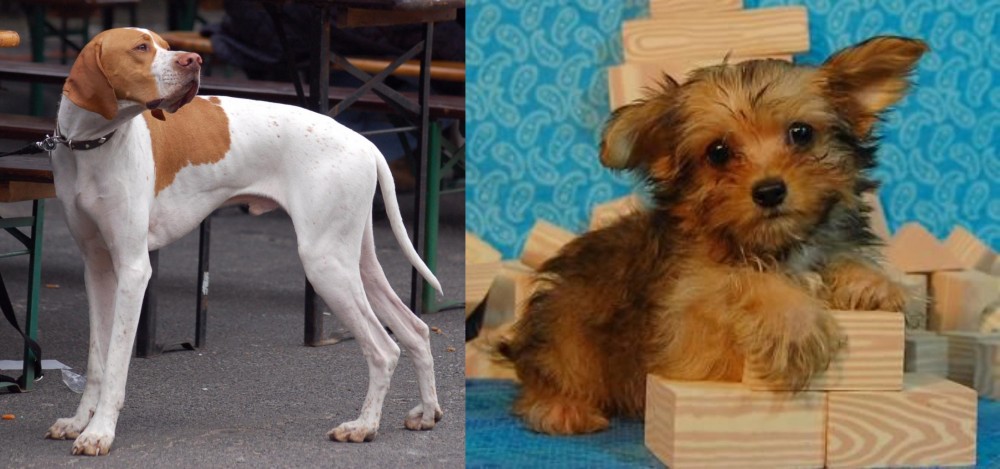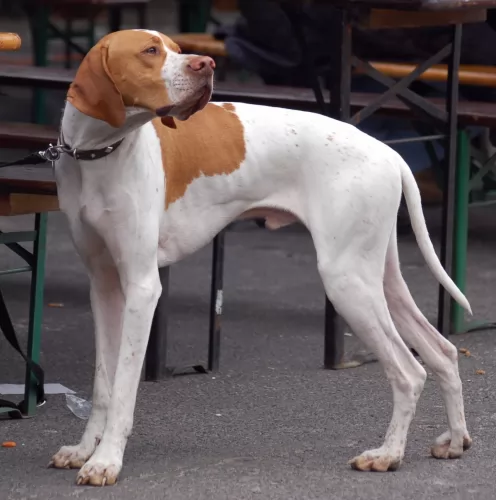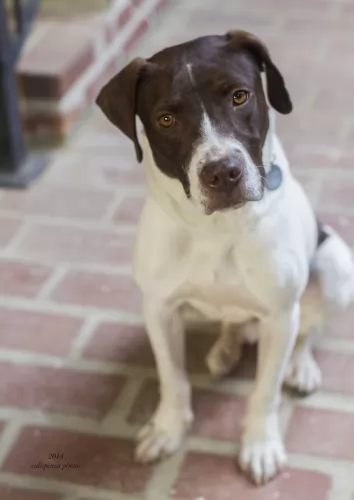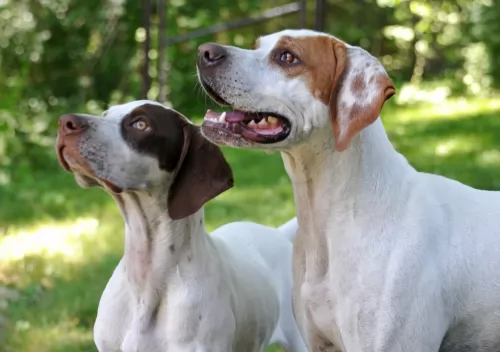 English Pointer is originated from United Kingdom but Yorkillon is originated from United States. English Pointer may grow 47 cm / 19 inches higher than Yorkillon. English Pointer may weigh 30 kg / 67 pounds more than Yorkillon. Both English Pointer and Yorkillon has same life span. English Pointer may have more litter size than Yorkillon. English Pointer requires Low Maintenance. But Yorkillon requires Moderate Maintenance
English Pointer is originated from United Kingdom but Yorkillon is originated from United States. English Pointer may grow 47 cm / 19 inches higher than Yorkillon. English Pointer may weigh 30 kg / 67 pounds more than Yorkillon. Both English Pointer and Yorkillon has same life span. English Pointer may have more litter size than Yorkillon. English Pointer requires Low Maintenance. But Yorkillon requires Moderate Maintenance
Basic Information
Group:
Sporting dog
Toy dog
undefined
United Kingdom
United States
Life Span:
12 - 14 Years
12 - 14 Years
Other Names:
English Pointer, Pointer
Papa-ShirePapa-Shire • Papiyork • Yorkie Pap Papillon-Yorkshire Terrier Mix, Papillon-Yorkie Mix,
Colors Available:
Black, Black & White, Lemon & White, Liver, Orange & White, Liver & White
White, brown and white, light brown/golden, dark brown/chocolate, black and brown, black
Coat:
short, smooth and shiny
Straight, medium, fine fine, soft coat
Temperament:
Alert, Courageous, Energetic, Gentle, Independent, Loyal, Protective, Sweet
Alert, Energetic, Friendly, Loving, Loyal, Playful
Grooming:
Low Maintenance
Moderate Maintenance
Trainability:
Moderate
Easy
New Owners Friendly:
No
Yes
History
 We can find records for pointers from 17th century. Breeds such as Old Spanish and Portuguese Pointer were set in to England from European Mainland. In 1800s they were brought to America and then they slowly developed their hunting skills and in 1910 they became an excellent bird hunter. In 1936 Modern American Kennel was established and they bred pointers in large quantities. They are very popular in southern United States and are called as "bird dog". Pointers are good in hunting birds like pheasant and grouse. They got their name because of their special skills in hunting.
We can find records for pointers from 17th century. Breeds such as Old Spanish and Portuguese Pointer were set in to England from European Mainland. In 1800s they were brought to America and then they slowly developed their hunting skills and in 1910 they became an excellent bird hunter. In 1936 Modern American Kennel was established and they bred pointers in large quantities. They are very popular in southern United States and are called as "bird dog". Pointers are good in hunting birds like pheasant and grouse. They got their name because of their special skills in hunting.
The Yorkillon is a bighearted cross between the Yorkshire Terrier and the Papillon. They are small dogs with huge attitudes and big ears. They are known to be sassy and get into trouble. They are playful, affectionate and intelligent. They were initially developed in the US sometime about 20-30 years ago.
Not recognized by the American Kennel Club as they are considered designer dogs or mixed breeds
Description
 Pointer has a long head and its body is perfectly suitable for hunting. In hunting the pointers shows hunter the direction of the bird and also they will go and get them after they were shot. They are well known for their speed, energy and continuous working. Pointers are also a good companion dog and love the family members so much. It is very easy to groom them as they have short coat. They are very alert and excellent watch dog.
Pointer has a long head and its body is perfectly suitable for hunting. In hunting the pointers shows hunter the direction of the bird and also they will go and get them after they were shot. They are well known for their speed, energy and continuous working. Pointers are also a good companion dog and love the family members so much. It is very easy to groom them as they have short coat. They are very alert and excellent watch dog.
If pointer is not set in huntng then they should be given lots of exercise daily. Pointers love to play and run with children. They will give a good company for cyclists. Pointers show their talents in dog shows especially in obedience and field trials. They will not worry about the crowd surrounding them and performs well. In performing at public, pointer will show perfect attention to its master. Pointer must be trained slowly from its puppyhood to get good results.
The Yorkillon is a small dog that can look like a Yorkie or a Papillon but most due have large ears like the Papillon. Both parent breeds have long hair and short legs. There is still a lot of first generation breeding, but most are now products of multigenerational breeding. This means that every puppy can look different and no two are likely to look the same.
Characteristics
Special talents
 Pointer is a wonderful kid friendly dog and a nice companion. Also he is very energetic,fun-loving and an excellent watchdog. Pointers are very courageous as well as obedient. They can work for a very long time. Early socialization will make them with a good behaviour.
Pointer is a wonderful kid friendly dog and a nice companion. Also he is very energetic,fun-loving and an excellent watchdog. Pointers are very courageous as well as obedient. They can work for a very long time. Early socialization will make them with a good behaviour.
Adaptability
They will be happy if they are given a fenced yard to play and spend their natural energy. They will not have a good behaviour in apartment living. Pointers always likes to be with some one in his family. They are suitable for areas having hot weather and they will not do better in cold weather.
Learning ability
Pointers have very high intelligence and thus they are very easy to train. Good behaviours must be taught to them and the main word they must learn is "NO". They should stop what they are doing when they hear the word "NO" from you. "Sit" is another important word they should learn. Training should be given friendly and not compelling them to do it. Giving reward to them will make them happy and give more interest in training.
1.Children friendliness yes but be careful the children do not hurt the small dogs. This is particularly true regarding the risk of tracheal collapse.
2.Special talents – loves to do tricks
3.Adaptability – can live anywhere in an apartment as well as a home, but he would prefer to have a fenced yard to run in.
4.Learning ability – extremely smart and very obedient
Health Problems
 Pointers face health problems such as gastric torsion, hypothyroidism and canine hip dysplasia. Overweight will also lead to many health problems in them. Other problems seen in them are cardiomyopathy, ectropion and progressive retinal atrophy.
Pointers face health problems such as gastric torsion, hypothyroidism and canine hip dysplasia. Overweight will also lead to many health problems in them. Other problems seen in them are cardiomyopathy, ectropion and progressive retinal atrophy.
Hair fall
They have the chances to get several skin disorders which leads to hairfall. Follicular Dysplasia is a hereditary disorder which causes hairfall. Special shampoos or lotion to combat the dry skin should be used to overcome this problem.
There are not a lot of hereditary health issues but there are some issues they can be prone to:
• Patellar Luxation – slipped knee caps can lead to lameness.
• Epilepsy – can be treated with medication.
• Diabetes – can be treated with medication
• Legg Calve Perthes Disease – blood disorder affecting hind leg bones.
• Heart defects
• Tracheal collapse
• Hip dysplasia – can cause lameness.
Caring The Pet
Feeding the puppy
 Normally puppies require more food when compared with adult to meet their growth needs. The food given to the pointer puppy must contain vitamins, carbohydrates and minerals. Also the food given to his mother should be continued to the puppy as to avoid digestive problems for the puppy. If it is needed to change the food then it should be done in a step by step process.
Normally puppies require more food when compared with adult to meet their growth needs. The food given to the pointer puppy must contain vitamins, carbohydrates and minerals. Also the food given to his mother should be continued to the puppy as to avoid digestive problems for the puppy. If it is needed to change the food then it should be done in a step by step process.
Feeding the adult
Pointer can be fed one or two times a day. Usally small meal is given in morning and full meal will be given in the evening. But in case if they will be left alone for the whole day then morning food shall be a full meal. They can be fed meat of goat, pork, fish and woodcock. Brown rice is a good food for pointer.
Points for Good Health
Pointers will be happy if they are always with their family. They enjoy when they are taken outside for playing or camping. Puppies don't need much exercise as adults need. Adults should not be fed too much as it will lead to overweight.
Games and Exercises
When pointer is given proper exercises and training they will be a very good mannered dog. They are very active and intelligent dogs and hence require exercise and training regularly. The breed was developed to be a hunting dog and can work continuously in a day. Pointers should be exercised a minimum of an hour per day. They will be happy to run along with your bicycle and playing frisbee with you.
1.Feeding the puppy Feed a high quality toy puppy food 3-4 meals per day a total of ¼ cup for the day.
2.Feeding the adult Feed a high quality toy puppy food 1-2 meals per day a total of ½ cup for the day.
3.Points for Good Health – No inherited issues.
4. Games and Exercises – These are high energy dogs as both parent breeds are such. They need to run, love having a fenced yard, 15-20 minute walks per day.
Comparison with other breeds
- English Pointer vs English Bulldog - Breed Comparison
- English Pointer vs German Shepherd - Breed Comparison
- English Pointer vs Golden Retriever - Breed Comparison
- English Pointer vs Labrador Retriever - Breed Comparison
- English Pointer vs West Highland White Terrier - Breed Comparison
- English Pointer vs French Bulldog - Breed Comparison
- English Pointer vs Beagle - Breed Comparison
- English Pointer vs Yorkshire Terrier - Breed Comparison
- English Pointer vs Poodle - Breed Comparison
- English Pointer vs Rottweiler - Breed Comparison
- English Pointer vs Boxer - Breed Comparison
- Siberian Husky vs English Pointer - Breed Comparison
- Doberman Pinscher vs English Pointer - Breed Comparison
- American Bully vs English Pointer - Breed Comparison
- Abruzzenhund vs English Pointer - Breed Comparison
- Affenpinscher vs English Pointer - Breed Comparison
- Afghan Hound vs English Pointer - Breed Comparison
- Aidi vs English Pointer - Breed Comparison
- Airedale Terrier vs English Pointer - Breed Comparison
- Akbash Dog vs English Pointer - Breed Comparison
- Akita vs English Pointer - Breed Comparison
- Africanis vs English Pointer - Breed Comparison
- Askal vs English Pointer - Breed Comparison
- Atlas Terrier vs English Pointer - Breed Comparison
- Aussie Poo vs English Pointer - Breed Comparison
- Yorkillon vs English Bulldog - Breed Comparison
- Yorkillon vs German Shepherd - Breed Comparison
- Yorkillon vs Golden Retriever - Breed Comparison
- Yorkillon vs Labrador Retriever - Breed Comparison
- Yorkillon vs West Highland White Terrier - Breed Comparison
- Yorkillon vs French Bulldog - Breed Comparison
- Yorkillon vs Beagle - Breed Comparison
- Yorkillon vs Yorkshire Terrier - Breed Comparison
- Yorkillon vs Poodle - Breed Comparison
- Yorkillon vs Rottweiler - Breed Comparison
- Yorkillon vs Boxer - Breed Comparison
- Yorkillon vs English Pointer - Breed Comparison
- Yorkillon vs Siberian Husky - Breed Comparison
- Yorkillon vs Doberman Pinscher - Breed Comparison
- Yorkillon vs American Bully - Breed Comparison
- Yorkillon vs Abruzzenhund - Breed Comparison
- Yorkillon vs Affenpinscher - Breed Comparison
- Yorkillon vs Afghan Hound - Breed Comparison
- Yorkillon vs Aidi - Breed Comparison
- Yorkillon vs Airedale Terrier - Breed Comparison
- Yorkillon vs Akbash Dog - Breed Comparison
- Yorkillon vs Akita - Breed Comparison
- Yorkillon vs Africanis - Breed Comparison
- Yorkillon vs Askal - Breed Comparison
- Yorkillon vs Atlas Terrier - Breed Comparison
 Petzlover
Petzlover English Pointer is originated from United Kingdom but Yorkillon is originated from United States. English Pointer may grow 47 cm / 19 inches higher than Yorkillon. English Pointer may weigh 30 kg / 67 pounds more than Yorkillon. Both English Pointer and Yorkillon has same life span. English Pointer may have more litter size than Yorkillon. English Pointer requires Low Maintenance. But Yorkillon requires Moderate Maintenance
English Pointer is originated from United Kingdom but Yorkillon is originated from United States. English Pointer may grow 47 cm / 19 inches higher than Yorkillon. English Pointer may weigh 30 kg / 67 pounds more than Yorkillon. Both English Pointer and Yorkillon has same life span. English Pointer may have more litter size than Yorkillon. English Pointer requires Low Maintenance. But Yorkillon requires Moderate Maintenance We can find records for pointers from 17th century. Breeds such as Old Spanish and Portuguese Pointer were set in to England from European Mainland. In 1800s they were brought to America and then they slowly developed their hunting skills and in 1910 they became an excellent bird hunter. In 1936 Modern American Kennel was established and they bred pointers in large quantities. They are very popular in southern United States and are called as "bird dog". Pointers are good in hunting birds like pheasant and grouse. They got their name because of their special skills in hunting.
We can find records for pointers from 17th century. Breeds such as Old Spanish and Portuguese Pointer were set in to England from European Mainland. In 1800s they were brought to America and then they slowly developed their hunting skills and in 1910 they became an excellent bird hunter. In 1936 Modern American Kennel was established and they bred pointers in large quantities. They are very popular in southern United States and are called as "bird dog". Pointers are good in hunting birds like pheasant and grouse. They got their name because of their special skills in hunting. Pointer has a long head and its body is perfectly suitable for hunting. In hunting the pointers shows hunter the direction of the bird and also they will go and get them after they were shot. They are well known for their speed, energy and continuous working. Pointers are also a good companion dog and love the family members so much. It is very easy to groom them as they have short coat. They are very alert and excellent watch dog.
Pointer has a long head and its body is perfectly suitable for hunting. In hunting the pointers shows hunter the direction of the bird and also they will go and get them after they were shot. They are well known for their speed, energy and continuous working. Pointers are also a good companion dog and love the family members so much. It is very easy to groom them as they have short coat. They are very alert and excellent watch dog. Pointer is a wonderful kid friendly dog and a nice companion. Also he is very energetic,fun-loving and an excellent watchdog. Pointers are very courageous as well as obedient. They can work for a very long time. Early socialization will make them with a good behaviour.
Pointer is a wonderful kid friendly dog and a nice companion. Also he is very energetic,fun-loving and an excellent watchdog. Pointers are very courageous as well as obedient. They can work for a very long time. Early socialization will make them with a good behaviour. Pointers face health problems such as gastric torsion, hypothyroidism and canine hip dysplasia. Overweight will also lead to many health problems in them. Other problems seen in them are cardiomyopathy, ectropion and progressive retinal atrophy.
Pointers face health problems such as gastric torsion, hypothyroidism and canine hip dysplasia. Overweight will also lead to many health problems in them. Other problems seen in them are cardiomyopathy, ectropion and progressive retinal atrophy. Normally puppies require more food when compared with adult to meet their growth needs. The food given to the pointer puppy must contain vitamins, carbohydrates and minerals. Also the food given to his mother should be continued to the puppy as to avoid digestive problems for the puppy. If it is needed to change the food then it should be done in a step by step process.
Normally puppies require more food when compared with adult to meet their growth needs. The food given to the pointer puppy must contain vitamins, carbohydrates and minerals. Also the food given to his mother should be continued to the puppy as to avoid digestive problems for the puppy. If it is needed to change the food then it should be done in a step by step process.